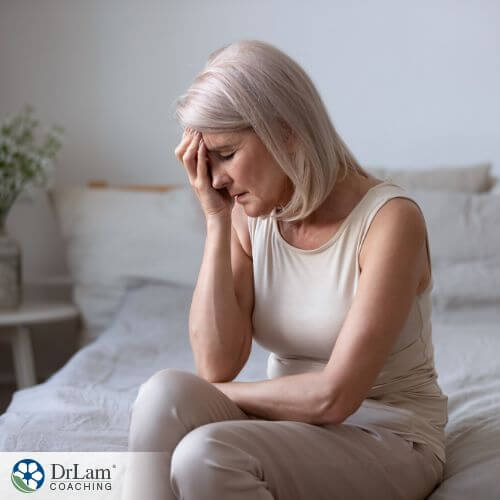 Menopause is a time in a woman's life that many dread. Some symptoms of menopause receive a lot of attention such as hot flashes and weight gain, especially around the belly. However, other symptoms can be shrouded in silence, leaving many menopausal women feeling alone and not knowing how to get relief. Sexual dysfunction is one of these under-addressed problems.
Menopause is a time in a woman's life that many dread. Some symptoms of menopause receive a lot of attention such as hot flashes and weight gain, especially around the belly. However, other symptoms can be shrouded in silence, leaving many menopausal women feeling alone and not knowing how to get relief. Sexual dysfunction is one of these under-addressed problems.
This article will try to remove any taboo around sexual dysfunction in menopause and explore what sexual dysfunction is, why it commonly happens during menopause, and remedies that can help.
When you think of the term sexual dysfunction, many may think that it only refers to males. However, sexual dysfunction can occur in women as well. Sexual dysfunction can occur in different ways and includes problems such as:
25-63% of women will experience sexual dysfunction in their lifetime, in menopause this number increases to 68-86.5%.
There are two varieties of sexual dysfunction common in menopause. These are hypoactive sexual desire disorder (HSDD) and genitourinary syndrome of menopause (GSM).
This refers to a low or absence of sexual desire that persists for a long period of time. There is a 69.3% occurrence of low sexual desire and 32.2% of HSDD in women between the ages of 40-65.
This condition may affect up to 50% of older women and is also known as vaginal atrophy. It affects the reproductive and urinary systems as well as the reproductive hormones. It includes a range of symptoms such as:
There are many causes of sexual dysfunction. However, in menopause, the main cause is the change in reproductive hormones.
Before menopause, your reproductive system, mainly your ovaries, produces hormones such as estrogen and progesterone. During your fertile years, the type of estrogen that your body produces is estradiol, the most potent form of estrogen. However, as your body prepares for menopause, there is a decline in the amount of estrogen and progesterone produced by your body as well as a shift from estradiol to a form of estrogen known as estrone, or E1.
Estradiol is mainly responsible for lubrication and sexual desire, and with lower levels can come sexual dysfunction symptoms. Other symptoms such as depression and anxiety can also be experienced during menopause, and this can exacerbate symptoms of sexual dysfunction. Depression and anxiety can also exacerbate low sexual desire, leading to a downward spiral.
Additional symptoms of menopause that can result in sexual dysfunction include weight gain, fatigue, and challenges falling asleep.
There are a range of natural strategies that can help to relieve sexual dysfunction. These include lifestyle, nutrition, and supplements.
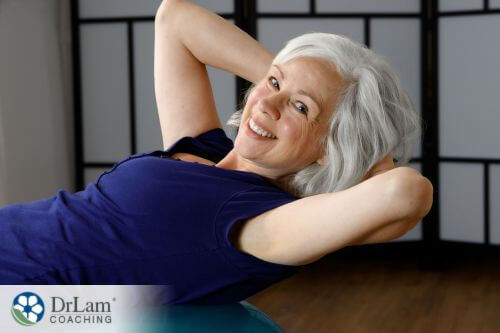 The role of exercise in improving heart health is well known, but you may not know that regular exercise can help to improve sexual health. When you exercise, your blood flow is increased, and this improves blood flow to your sexual organs. This can help improve lubrication and sensations.
The role of exercise in improving heart health is well known, but you may not know that regular exercise can help to improve sexual health. When you exercise, your blood flow is increased, and this improves blood flow to your sexual organs. This can help improve lubrication and sensations.
The recommendation for exercise is 150 minutes of moderate-intensity exercise per week that includes a combination of cardio and resistance exercise.
It is also important to include exercises that improve your pelvic muscles. During menopause, your vaginal muscles can begin to lose muscular tone. These exercises improve blood flow to your sexual organs and help to assist with blood flow and arousal. They can also help with other symptoms in GSM such as urinary incontinence.
Exercise can also help sexual dysfunction indirectly. Exercise can help to manage your weight and keep it within a healthy range. A healthy weight not only improves self-confidence and well-being but also helps to increase sexual desire.
In addition, during and after exercise, endorphins are released into the body. These are natural antidepressants and can help to improve mental health, reducing feelings of depression and anxiety that can be common during menopause. Depression and anxiety can exacerbate sexual dysfunction. Thus, by improving mental health, it can indirectly help to improve sexual health.
Whilst studies have found that smoking itself does not cause sexual dysfunction, research does suggest that addiction to nicotine can. Nicotine is the addictive component in cigarettes and is known to narrow blood vessels. This can make it harder for the blood to flow to the sexual organs, reducing sensation and arousal. Studies show nicotine can also reduce levels of estrogen in the blood by forming catechol estrogen metabolites, reducing libido and lubrication (1).
Avoiding or stopping smoking can help to improve the blood flow to your sexual organs and help preserve your already lower estrogen levels.
During sexual dysfunction, sex can quickly become something that was once enjoyable into a tense and fraught experience with your partner. This is why it is important to focus on strengthening the relationship in and out of the bedroom.
If you are with a partner, remember to spend time with them and that intimacy can be experienced and given in different ways. These include holding hands, cuddling, kissing, and hugging. Spending time on the relationship in the form of dates such as dinners and activities can also help improve your connection with your partner. This can then help to improve your connection with your partner and your satisfaction with the relationship both in and out of the bedroom.
Continue focusing on the relationship in the bedroom as well. Remember there is no time limit on sex. Start slowly and remember foreplay. This will help with arousal as well as lubrication.
Having fun may seem obvious but during sexual dysfunction, it is sometimes easy to overfocus on trying to reach orgasm, and sometimes pressure results from it not happening. Having fun in the bedroom and focusing on having fun without the goal of having an orgasm can help. Changing it up with sex toys such as vibrators can also help to introduce a new playfulness and can help to improve your and your partner's fun.
Sexual exploration is also important and this refers to touching yourself and if you are comfortable with it, masturbating. This can help you to learn more about your body, what you like and what you don't like. Once you know this, you can help guide your partner.
Regular sexual activity can also help to improve blood flow to the vagina and can help to keep the tissues healthy, potentially reducing sexual dysfunction over time.
 When you are experiencing sexual dysfunction, it can be easy to turn to alcohol to numb the emotions and sometimes pain that is experienced. Some might even consider alcohol a way to relax and "get in the mood."
When you are experiencing sexual dysfunction, it can be easy to turn to alcohol to numb the emotions and sometimes pain that is experienced. Some might even consider alcohol a way to relax and "get in the mood."
However, alcohol can exacerbate sexual dysfunction. Research shows that alcohol can cause a reduction in the blood flow to the vagina and reduce the intensity of orgasm. If you are currently experiencing sexual dysfunction, this could exacerbate your symptoms and reduce your sexual experience.
If you can, avoid alcohol. However, if you would like to keep alcohol in your lifestyle it is important to keep to the recommendations of no more than one alcoholic beverage per day for females.
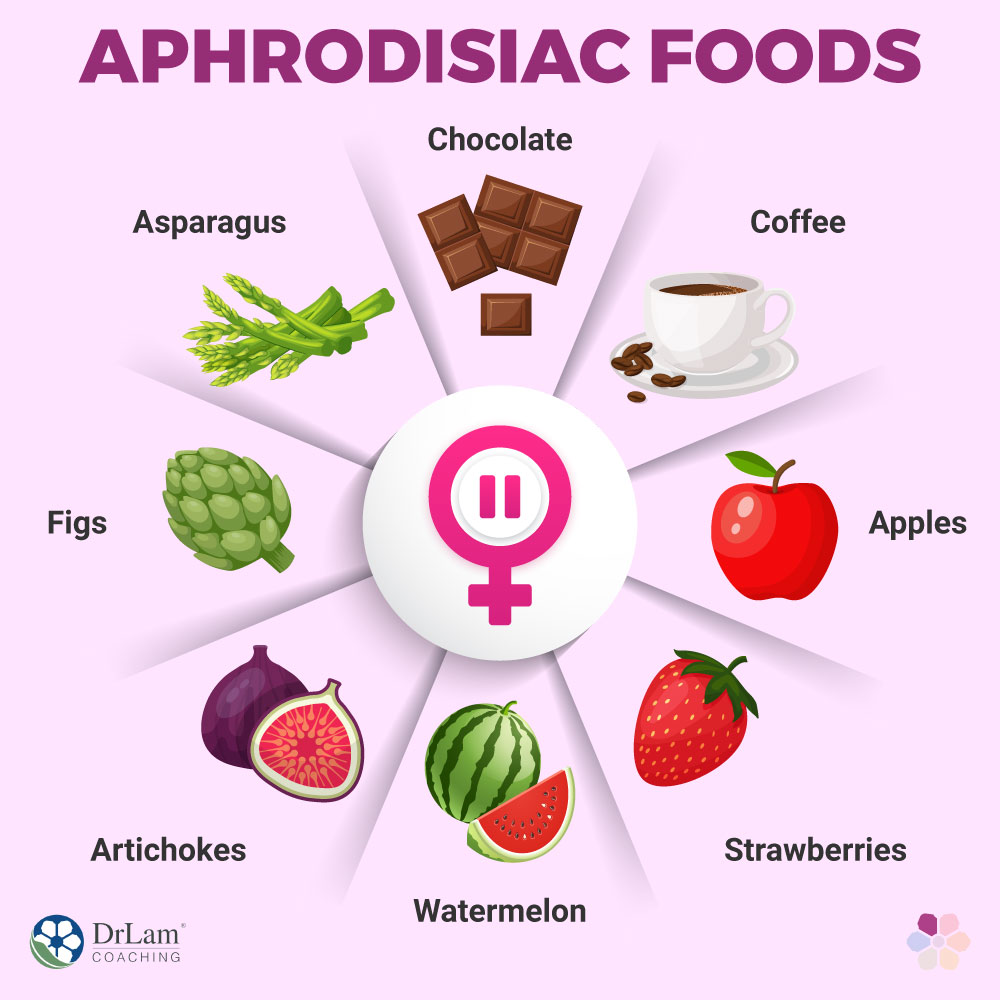
Nutrition is an excellent way to improve your sexual health. There are a range of foods that can help to improve sex drive and estrogen levels, indirectly assisting with sexual dysfunction. Foods that may act as aphrodisiacs include:
There are also several foods that contain phytoestrogens. These are plant-based compounds that mimic the effects of estrogen. One of the main causes of sexual dysfunction in menopause is the reduction in estrogen. Phytoestrogens can potentially help to boost estrogen levels and assist in balancing sexual hormones. Foods that are rich in phytoestrogens include:
Research focusing on the effect of phytoestrogens on sexual functioning has found that phytoestrogens from fennel, fenugreek tea, and maritime pine bark did improve sexual functioning, and fenugreek tea was also found to improve libido (2).
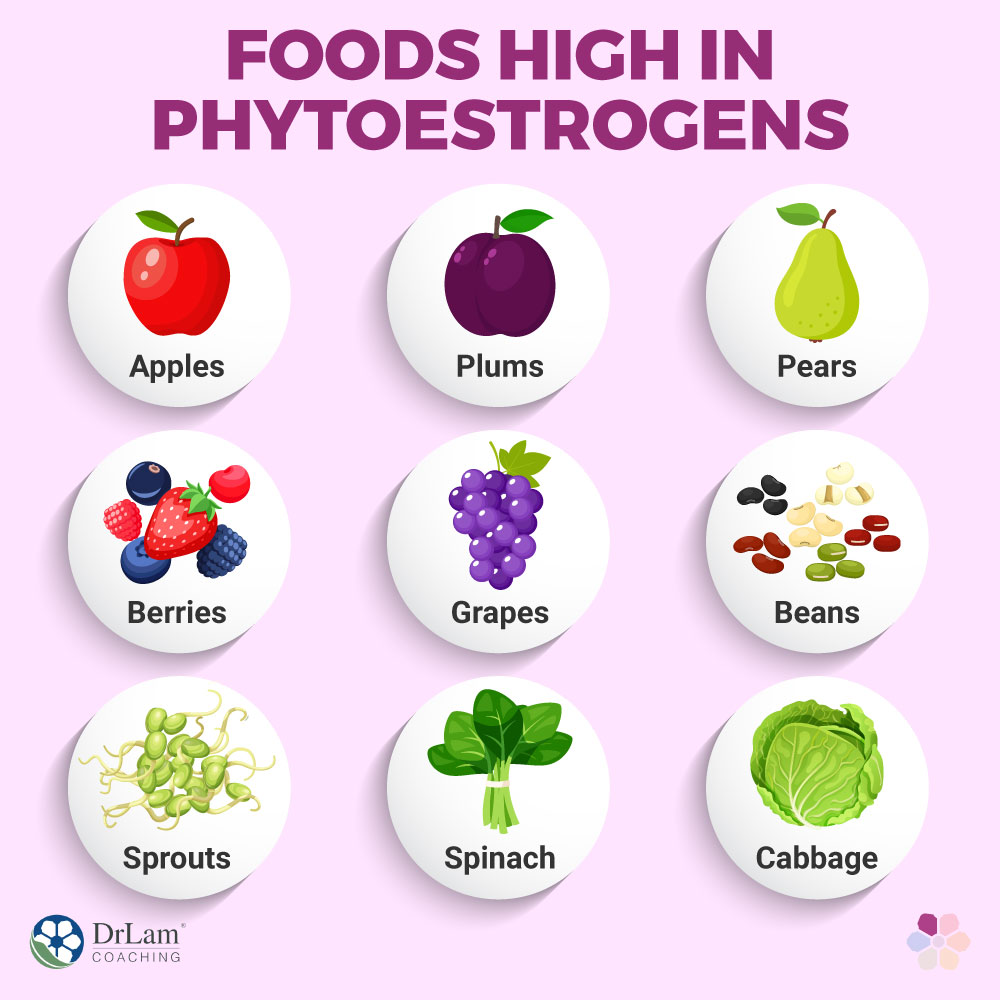
Several compounds and herbs can assist with improving sexual functioning and health. Some of these compounds and herbs can be tricky to consume in the diet, especially in the amount needed to have an effect. That's where supplements can assist. There is a range of supplements that claim to improve sexual dysfunction, but it can be overwhelming when you start looking at these supplements. Let's take a look at some supplements that can help to assist you with sexual dysfunction.
EPO Pro contains evening primrose oil (EPO), an oil from a wildflower that is abundant in the US. This oil is rich in an omega-6 fatty acid, gamma-linolenic acid (GLA). Your body cannot make this fatty acid and relies on your diet for it. EPO is one of the richest sources of GLA and is a building block for the production of prostaglandins, lipids with hormone-like functions that can regulate your reproductive health. Without adequate amounts of this fatty acid, your hormone production will be affected, and this can then affect your sexual health.
Not only can it help to assist with sexual health, but it also plays a role in reducing hot flashes and promoting healthy skin and nails.
This supplement is in soft gel form and consists of 1300mg of evening primrose oil and 120mg of GLA. The recommended serving size is one to two soft gels daily. For guidance on whether this could work for you, chat with your healthcare provider.
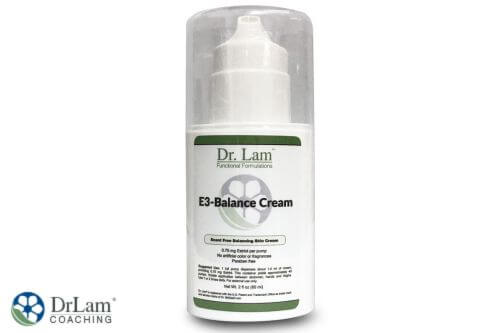 This supplement is a cream that can be used vaginally. It has a combination of ingredients that work together to support vaginal dryness. These ingredients include EPO, black cohosh root extract, and estriol also known as E3.
This supplement is a cream that can be used vaginally. It has a combination of ingredients that work together to support vaginal dryness. These ingredients include EPO, black cohosh root extract, and estriol also known as E3.
Black cohosh is native to North America and can assist with balancing estrogen. It's commonly used to treat menopausal symptoms such as hot flashes and vaginal dryness. Research on the use of black cohosh to assist with menopause is lacking, although it is promising enough for reviews to recommend more research be conducted (3).
The other ingredient that is in this cream is estriol. This form of estrogen is mainly produced during pregnancy. However, its use in menopause is well documented, and research shows that it can help to assist with reducing menopausal symptoms and improving sexual health by improving lubrication as well as reducing the frequency of urinary tract infections. It can also assist with maintaining the health of the vaginal tissues (4).
This supplement is a measured pump, meaning that one pump will provide 1.5 ml of cream and 0.75mg of estriol. The recommended dose is one pump placed vaginally daily for two weeks, then twice a week after moisturization has been achieved.
During menopause, not only do your estrogen levels decrease, but your progesterone also decreases. In peri-menopause, the period before menopause, progesterone is one of the first reproductive hormones to reduce. This can affect the balance between estrogen and progesterone leading to estrogen dominance and symptoms such as weight gain around the midsection.
This is where P-Balance cream can step in. It can help to balance the ratio of estrogen and progesterone, helping to reduce symptoms of estrogen dominance. It includes a combination of ingredients with the main ingredient being USP progesterone. This supplement contains a measured pump system with one pump providing 1.5 ml of cream and 20mg of USP progesterone. It should be placed on the inner arms or inner thighs to prevent transference to other parties.
Adrenal Fatigue Syndrome (AFS) describes a group of symptoms that individuals can experience due to chronic stress. Your body handles short-term stress through your adrenal glands and the NeuroEndoMetabolic (NEM) Stress Response System. In response to stress, your adrenal glands produce stress hormones such as cortisol. When stress becomes long-term, your adrenal glands can become depleted. This results in inadequate levels of the stress hormone cortisol, imbalances within the NEM, and AFS.
Your NEM system consists of six different circuits of related organs and systems, including the hormonal circuit. It consists of the adrenal glands, thyroid glands, and reproductive organs and helps to regulate the hormone function in your body.
If there is an imbalance within this circuit, it can cause fatigue, infertility, weight gain, low libido, and irregular periods. It can also lead to estrogen dominance and hormone imbalance, already common in menopause.
When the body has a high demand for cortisol, it can begin to deplete the levels of other hormones that use the same precursors, such as progesterone. This lowers progesterone levels and affects the fine balance between estrogen and progesterone causing estrogen dominance. Estrogen dominance can affect your sexual health by reducing libido. During menopause, the natural shift in hormones can worsen imbalances within the hormonal circuit and can exacerbate symptoms of sexual dysfunction such as low libido.
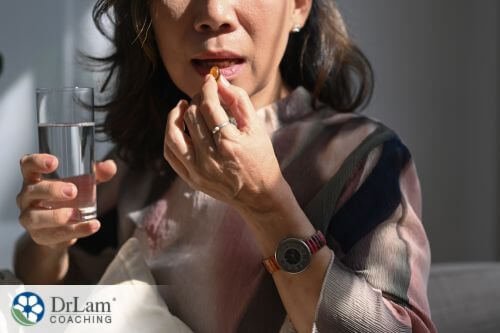 There are many strategies that can help to provide relief from sexual dysfunction. However, in AFS some of these strategies should be practiced with caution and with guidance from a healthcare professional. AFS increases your body's sensitivity and can cause your body to react negatively to any new products such as foods and supplements that are introduced. This reaction can then set you back in your healing journey. Supplementation is one of these products to be mindful of. The FDA does not regulate supplements; therefore the quality of the ingredients is not always guaranteed, and there is a chance of impure ingredients being in the supplement. This makes it important to use a supplement from a reputable company. It is also important to chat with your healthcare provider for guidance if you would like to use supplementation.
There are many strategies that can help to provide relief from sexual dysfunction. However, in AFS some of these strategies should be practiced with caution and with guidance from a healthcare professional. AFS increases your body's sensitivity and can cause your body to react negatively to any new products such as foods and supplements that are introduced. This reaction can then set you back in your healing journey. Supplementation is one of these products to be mindful of. The FDA does not regulate supplements; therefore the quality of the ingredients is not always guaranteed, and there is a chance of impure ingredients being in the supplement. This makes it important to use a supplement from a reputable company. It is also important to chat with your healthcare provider for guidance if you would like to use supplementation.
Exercise is another strategy to be mindful of. Whilst exercise can help with improving sexual dysfunction, vigorous exercise can worsen AFS. If you are currently experiencing AFS, exercises such as gentle walking or yoga can be more beneficial to the body and can also help to relax your nervous system.
Sexual dysfunction is something that affects many women going through menopause and can result in a range of symptoms. Luckily these symptoms can be relieved through strategies such as:
If you are currently experiencing a loss of libido and changes in your sexual health, there are steps you can take to improve the situation. In Dr. Lam's Adrenal Fatigue Recovery Program, you'll learn about your stage of adrenal fatigue, how to use the supplements, which foods to eat, the exercises that benefit you, and much more. This course is about helping you make informed choices and avoiding the pitfalls Dr. Lam faced in his recovery journey.
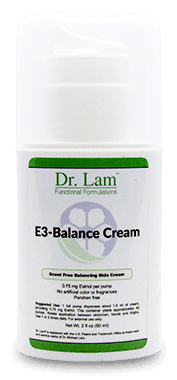
Revive your intimacy with E-3 Balance Cream!
Choi J., et al. "Dose-Response Relationship Between Cigarette Smoking And Female Sexual Dysfunction." Obstet Gynecol Sci, vol. 58, no. 4, 2015, Jul. pp. 302-08. https://www.ncbi.nlm.nih.gov/pmc/articles/PMC4515480/
Najafi MN, Ghazanfarpour M. "Effect of Phytoestrogens on Sexual Function in Menopausal Women: a Systematic Review and Meta-Analysis." Climacteric, vol, 21, no. 5, 2018 Oct. pp. 437-45. https://pubmed.ncbi.nlm.nih.gov/30156931/
National Institutes of Health. "Black Cohosh." Updated 3 June 2020. https://ods.od.nih.gov/factsheets/BlackCohosh-HealthProfessional/
Hirschberg AL., et al. "Efficacy and Safety of Ultra-Low Dose 0.005% Estriol Vaginal Gel for the Treatment of Vulvovaginal Atrophy in Postmenopausal Women with Early Breast Cancer Treated with Nonsteroidal Aromatase Inhibitors: a Phase II, Randomized, Double-Blind, Placebo-Controlled Trial." Menopause, vol. 27, no. 5, 2020 May, pp. 526-34. https://www.ncbi.nlm.nih.gov/pmc/articles/PMC7188038/
Sexual dysfunction can be reduced successfully. In order for this to happen, the underlying causes resulting in sexual dysfunction need to be addressed. Strategies to do this include increasing exercise, focusing on improving your relationship with your partner, avoiding smoking and alcohol, eating foods high in phytoestrogens, and using medicated creams.